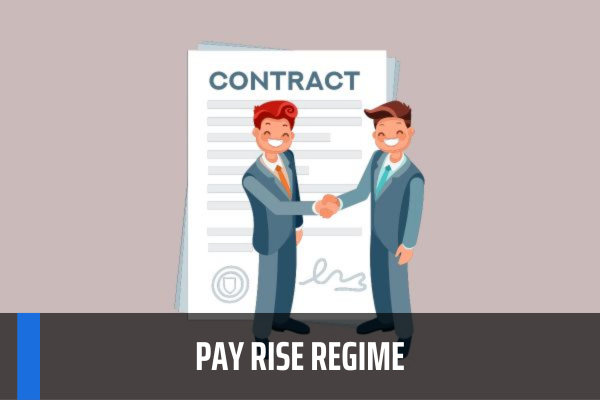Is it compulsory for employment contracts to contain pay rise regime in Vietnam?
Is it compulsory for employment contracts to contain pay rise regime in Vietnam?
According to the provisions of Clause 1, Article 21 of the 2019 Labor Code as follows:
Contents of employment contracts
1. An employment contract shall have the following major contents:
a) The employer’s name, address; full name and position of the person who concludes the contract on the employer’s side;
b) Full name, date of birth, gender, residence, identity card number or passport number of the person who concludes the contract on the employee’s side;
c) The job and workplace;
d) Duration of the employment contract;
dd) Job- or position-based salary, form of salary payment, due date for payment of salary, allowances and other additional payments;
e) Regimes for promotion and pay rise;
g) Working hours, rest periods;
h) Personal protective equipment for the employee;
i) Social insurance, health insurance and unemployment insurance;
k) Basic training and advanced training, occupational skill development.
...
Accordingly, regimes for promotion and pay rise are one of the contents that must be included in the labor contract.
In addition, according to Clause 6, Article 3, Circular 10/2020/TT-BLDTBXH stipulates as follows:
Major contents of an employment contract
Major contents of an employment contract as prescribed in clause 1 Article 21 of the Labor Code:
...
6. Advancement in pay step, pay raise: as agreed by the contracting parties concerning conditions, time, pay rate after advancement in pay step, pay raise, or as regulated in the collective bargaining agreement, or as stipulated by the employer.
...
Thus, the employee and the employer shall follow the pay step, pay raise as agreed by the contracting parties concerning conditions, time, pay rate after advancement in pay step, pay raise, or as regulated in the collective bargaining agreement, or as stipulated by the employer.

Is it compulsory for employment contracts to contain pay rise regime in Vietnam?
What are the regulations on the salary payment forms in Vietnam?
According to Clause 1, Article 96 of the 2019 Labor Code, regulations on salary payment are as follows:
Salary payment forms
1. The employer and employee shall reach an agreement on whether the salary is time-based, product-based (piece rate) or a fixed amount.
2. Salary shall be paid in cash or transferred to the employee’s personal bank account.
In case of bank transfer, the employer shall pay the costs of account opening and transfer.
3. The Government shall elaborate this Article.
Accordingly, the employer and employee shall reach an agreement on whether the salary is time-based, product-based (piece rate) or a fixed amount.
Specifically, Article 54 of Decree 145/2020/ND-CP stipulates as follows:
- Time-based salary shall be paid to the employee monthly, weekly, daily or hourly as agreed in the employment contract. To be specific:
+ Monthly salary is the salary for a month’s work;
+ Weekly salary is the salary for a week’s work. In case monthly salary is specified in the employment contract, the weekly salary equals (=) the monthly salary multiplied by (x) 12 months and divided by (:) 52 weeks;
+ Daily salary is the salary for a days’ work. In case monthly salary is specified in the employment contract, the daily salary equals (=) the monthly salary divided by (:) the number of normal working days in a month as decided by the employer. In case weekly salary is specified in the employment contract, the daily salary equals (=) the weekly salary divided by (:) the number of working days in a week as specified in the employment contract;
+ Hourly salary is the salary for an hour’s work. In case monthly, weekly or daily salary is specified in the employment contract, the hourly salary equals (=) the daily salary divided by (:) the number of normal working hours in a day as prescribed by Article 105 of the Labor Code.
- Piece rate pay is paid to piece workers according to the quantity and quality of products, productivity norms and unit prices of the products.
- Fixed salary is paid according to the quantity and quality of works and time needed for completion of these works.
What are the cases where an employer has the right to unilaterally terminates the employment contract in Vietnam?
Pursuant to Article 36 of the 2019 Labor Code, it is stipulated as follows:
The right of an employer to unilaterally terminates the employment contract
1. An employer shall have the right to unilaterally terminate an employment contract in one of the following circumstances:
a) The employee repeatedly fails to perform his/her work according to the criteria for assessment of employees’ fulfillment of duties established by the employer. The criteria for assessment of employees’ fulfillment of duties shall be established by the employer with consideration taken of opinions offered by the representative organization of employees (if any);
b) The employee is sick or has an accident and remains unable to work after having received treatment for a period of 12 consecutive months in the case of an indefinite-term employment contract, for 06 consecutive months in the case of an employment contract with a fixed term of 12 – 36 months, or more than half the duration of the contract in case of an employment contract with a fixed term of less than 12 months.
Upon recovery, the employer may consider concluding another employment contract with the employee;
c) In the event of a natural disaster, fire, major epidemic, hostility, relocation or downsizing requested by a competent authority, the employer has to lay off employees after all possibilities have been exhausted;
d) The employee is not present at the workplace after the time limit specified in Article 31 of this Labor Code;
dd) The employee reaches the retirement age specified in Article 169 of this Labor Code, unless otherwise agreed by the parties;
e) The employee is not present at work without acceptable excuses for at least 05 consecutive working days;
g) The employee fails to provide truthful information during the conclusion of the employment contract in accordance with Clause 2 Article 16 of this Labor Code in a manner that affects the recruitment.
2. When unilaterally terminating the employment contract in any of the cases specified in Point a, b, c, dd and g Clause 1 of this Article, the employer shall inform the employee in advance:
a) at least 45 days in case of an indefinite-term employment contract;
b) at least 30 days in case of an employment contract with a fixed term of 12 – 36 months;
c) at least 03 working days in the case of an employment contract with a fixed term of less than 12 months and in the cases stipulated in Point b Clause 1 of this Article;
d) The notice period in certain fields and jobs shall be specified by the government.
3. When unilaterally terminating the employment contract in the cases mentioned in Point d and Point e Clause 1 of this Article, the employer is not required to inform the employee in advance.
Thusm, the employer has the right to unilaterally terminate the employment contract in the above cases.
LawNet
